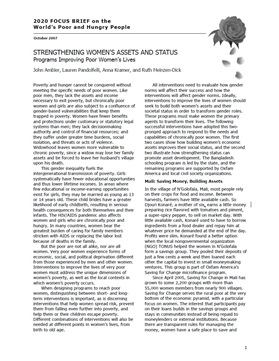Focal point
Location
About IFPRI
The International Food Policy Research Institute (IFPRI) provides research-based policy solutions to sustainably reduce poverty and end hunger and malnutrition in developing countries. Established in 1975, IFPRI currently has more than 500 employees working in over 50 countries. It is a research center of theCGIAR Consortium, a worldwide partnership engaged in agricultural research for development.
Vision and Mission
IFPRI’s vision is a world free of hunger and malnutrition. Its mission is to provide research-based policy solutions that sustainably reduce poverty and end hunger and malnutrition.
What We Do
Research at IFPRI focuses on six strategic areas:
- Ensuring Sustainable Food Production: IFPRI’s research analyzes options for policies, institutions, innovations, and technologies that can advance sustainable food production in a context of resource scarcity, threats to biodiversity, and climate change. READ MORE
- Promoting Healthy Food Systems: IFPRI examines how to improve diet quality and nutrition for the poor, focusing particularly on women and children, and works to create synergies among the three vital components of the food system: agriculture, health, and nutrition. READ MORE
- Improving Markets and Trade: IFPRI’s research focuses on strengthening markets and correcting market failures to enhance the benefits from market participation for small-scale farmers. READ MORE
- Transforming Agriculture: The aim of IFPRI’s research in this area is to improve development strategies to ensure broad-based rural growth and to accelerate the transformation from low-income, rural, agriculture-based economies to high-income, more urbanized, and industrial service-based ones. READ MORE
- Building Resilience: IFPRI’s research explores the causes and impacts of environmental, political, and economic shocks that can affect food security, nutrition, health, and well-being and evaluates interventions designed to enhance resilience at various levels. READ MORE
- Strengthening Institutions and Governance: IFPRI’s research on institutions centers on collective action in management of natural resources and farmer organizations. Its governance-focused research examines the political economy of agricultural policymaking, the degree of state capacity and political will required for achieving economic transformation, and the impacts of different governance arrangements.
Research on gender cuts across all six areas, because understanding the relationships between women and men can illuminate the pathway to sustainable and inclusive economic development.
IFPRI also leads two CGIAR Research Programs (CRPs): Policies, Institutions, and Markets (PIM) andAgriculture for Nutrition and Health (A4NH).
Beyond research, IFPRI’s work includes partnerships, communications, and capacity strengthening. The Institute collaborates with development implementers, public institutions, the private sector, farmers’ organizations, and other partners around the world.
Resources
Displaying 901 - 905 of 1521Could payments for environmental services improve rangeland management in Central Asia, West Asia and North Africa?
Although several institutional and management approaches that address the degradation of the rangelands have been tested in the dry areas of Central and West Asia and North Africa (CWANA), impact has been limited. Nonetheless, the development of National Action Plans to combat desertification highlights the interest of governments to tackle this issue. Payment for Environmental Services (PES) may be a viable policy option, though, to date, most PES programs have focused on the management of different resources (forests, watersheds).
Políticas de desarrollo rural y utilización sostenible de la tierra en las zonas de ladera de Honduras
Abstract
Políticas de desarrollo rural y uso sostenible de la tierra en las zonas de ladera de Honduras
Research report
Strengthening women's assets and status
This short articles provides three examples of successful projects that have improved women's lives. The example from Mozambique focuses specifically on the change of property laws towards gender equity and the implementation strategy, which included working with traditional leaders to produce legal change.
You can download this publication from the IFPRI website.
Micro-level analysis of farmers' adaptation to climate change in Southern Africa
Adaptation to climate change involves changes in agricultural management practices in response to changes in climate conditions. It often involves a combination of various individual responses at the farm-level and assumes that farmers have access to alternative practices and technologies available in the region.






